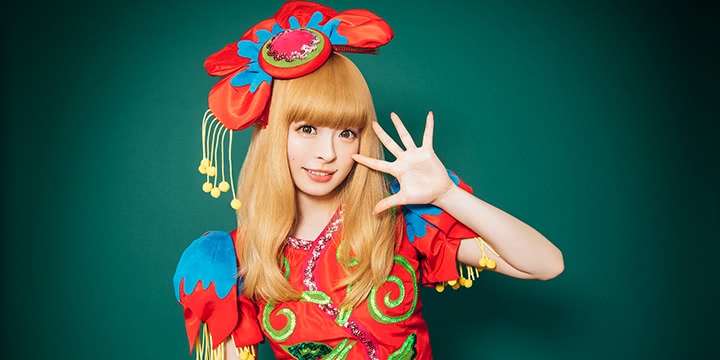The name Kyary Pamyu Pamyu is near-synonymous with J-pop.
Her latest album, 2014’s Pika Pika Fantajin, was her third straight Japanese number one, leading to countrywide notoriety and a number of sold-out stadium shows. But it’s the extent of her international profile that lifts her above many of her J-pop contemporaries. She’s toured North America, Europe and Australia, received kudos from Katy Perry and Grimes, and even gained critical recognition from Pitchfork.
In January, Kyary announced a five-step plan to spread more Japanese energy around the world this year. Along with her greatest hits package, KPP Best, and the installation of a Kyary-themed ride at Universal Studios Japan, she unveiled dates for an extensive world tour, which includes two Australian shows this month.
“I’m really looking forward to the Australian concerts,” Kyary says via a translator. “I went to Sydney before, but never to Melbourne, and the theme for this tour is flowers. It’s a new theme for my activities, so I want my fans to be very excited for me to come.”
Almost all of Kyary’s lyrics are in Japanese. For years, artists from non-English-speaking countries have adjusted to market demands and decided to sing in English. However, Kyary’s decision to sing in Japanese hasn’t hindered her international success, which could be due to the overall mood conveyed by her songs.
“Even in Japanese there are some lyrics that have no meaning,” she says. “I think how it sounds – [it’s] just a sound. It’s important for me to sing in Japanese as a Japanese person. And the lyrics, even though it’s in Japanese, I make it sound good. So it doesn’t matter if it’s Japanese or in English or any other language, it’s a good feeling you have from the lyrics.”
However, while the songs are able to communicate something even without the lyrics being understood, a large percentage of Kyary’s non-Japanese fans make an effort to memorise her lyrics.
“My fans go through the translating lyrics sites and they remember the lyrics, how they sound, and sing with me when I perform,” she says. “So I don’t think that they don’t really understand the lyrics. My fans actually study what I’m trying to say when I’m singing in the song.”
Prior to gaining enormous popularity as a pop performer, Kyary found success as a fashion blogger and model. While she’s no longer engaged in these pursuits, a lot of attention is given to her unique style – embracing Harajuku street fashion and Western trends – and the visual design of her music videos and album covers. But she’s confident her image doesn’t overshadow her music.
“I don’t really think the attention to fashion distracts attention from the music because it’s linked in total,” she says. “Yasutaka Nakata produces my style, fashion and music, so it doesn’t really distract [attention from] my music.”
Nakata is an accomplished producer and songwriter who’s worked with other Japanese pop acts like Perfume and Capsule. So far he has composed and produced all of Kyary’s music, and she explains the nature of their creative partnership.
“Usually when I record with Yasutaka I go to dinner after recording, and when I go to dinner I talk – like what happened recently in my life and what I want to make and what I’m in to right now. So Yasutaka gets ideas and he makes music after he has enough information from me. So when he has a new song ready for me, I don’t really reject that or make new revisions for the track he makes.”
Kyary Pamyu Pamyu’sKPP Bestis out now through Warner, and she performs at the Big Top Sydney, Luna Park, on Friday June 24.

































